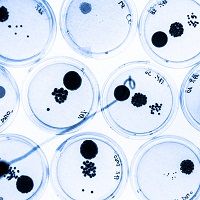Dead and Living Bacteria Can Reduce Colorectal Cancer Growth
Dead bacteria were found to effectively kill colorectal cancer cells.

Dead bacteria were found to effectively kill colorectal cancer cells.
According to findings presented in Scientific Reports, researchers from Nanyang Technological University in Singapore used the soil bacteria known as Clostridium sporongenes in its dead form to destroy colon tumor cells.
The researchers noted that traditional cancer therapies like chemotherapy or radiation are not generally effective for colorectal cancer patients because of the reduced blood flow and lack of oxygen and nutrient flow to the tumor area. This is due to these therapies’ reliance on oxygen molecules to damage the DNA of the cancer cells and use of the blood flow to transport therapeutic drugs to the tumor.'
Instead, the researchers were able to demonstrate that the dead soil bacteria killed the tumor cells in an oxygen-depleted tumor microenvironment. The investigators used a 3D cell culture, which was artificially created — most experiments are done on flat surfaces, like in a petri dish.
During a 72-hour period, the researchers observed the inactive bacteria reducing the colon tumor growth by 74%. The team also tested live bacteria’s ability to reduce the tumor cells, and some secretions from the bacteria reduced the colon tumor by up to 83%.
“We found that even when the C. sporogenes bacteria is dead, its natural toxicity continues to kill cancer cells, unlike the conventional chemotherapy drugs which need oxygen to work,” study leader Professor Teoh Swee Hin explained in a statement. “While other research groups have experimented with bacteria therapy to destroy cancer cells, the biggest problem is that live bacteria will grow and proliferate, posing a high risk of infection and increased toxicity to patients. As the bacteria were already killed by heat, there was no risk of the bacteria multiplying and causing more harm than the desired dose meant to kill colorectal cancer cells.”
The researchers believe that this finding will open the door to similar treatments being tested, especially because bacteria therapy is harboring interest as an alternative to traditional therapies. The investigators hope to study the specific components of the bacteria to identify what mechanisms kill tumor cells and eventually develop them into usable therapy, such as cancer drugs.